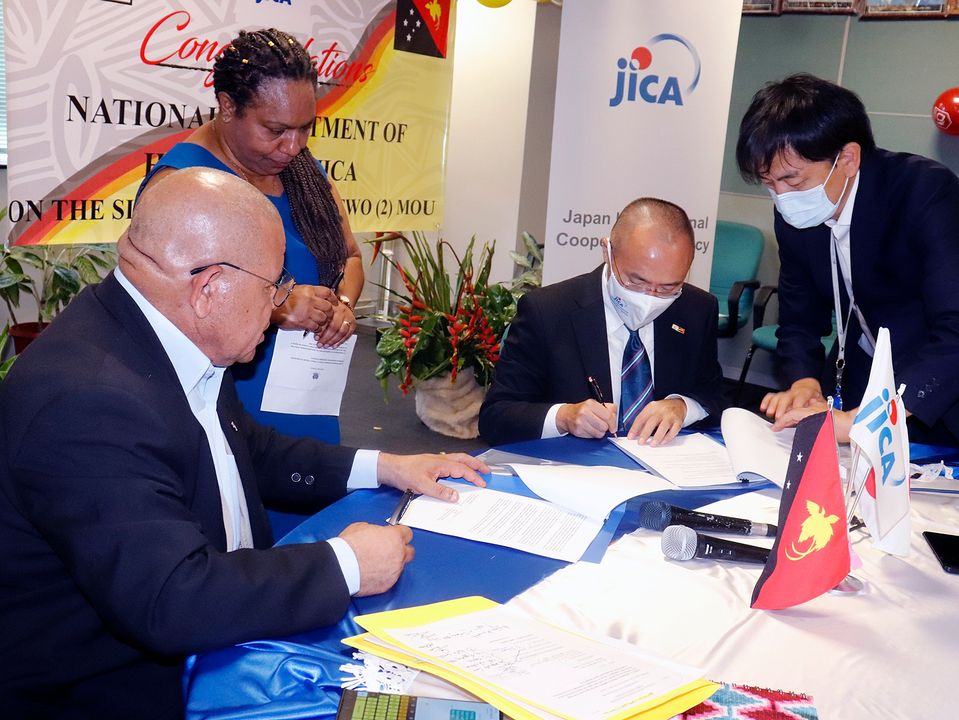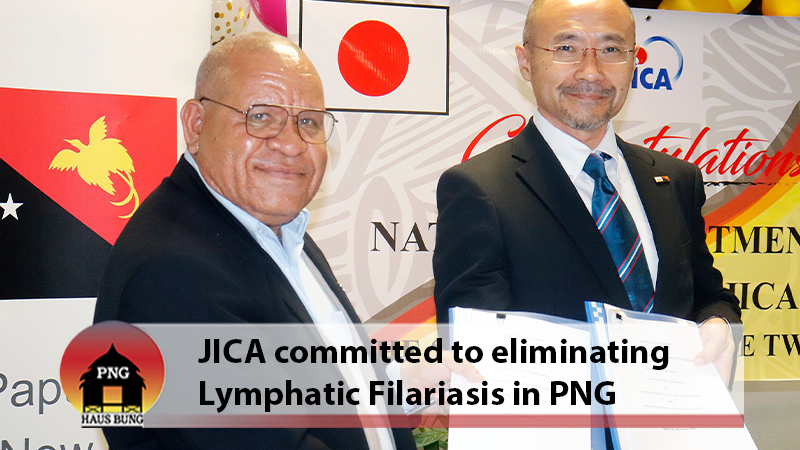The Program to Eliminate Lymphatic Filariasis in PNG is showing encouraging signs in New Ireland where the prevalence rate has been reduced from 30 per cent to one per cent.
This was revealed at the signing of a Memorandum of Understanding between the governments of PNG and Japan for the program, funded by JICA, to be continued.
The notes on the Phase 2 LF project Record of Discussion were signed by National Department of Health Deputy Secretary (Public Health) Ken Wai and JICA Chief Representative to PNG Mr Masato Koinuma.
The phase 2 of the program will be extended to cover other provinces where the disease is endemic.
The Pacific Program to Eliminate Lymphatic Filariasis in PNG has been implemented by the National Department of Health since 2004 in close consultation with WHO and other partners, however, not much has been achieved since then in terms of treatment coverages and reduction in the disease burden.
JICA, one of the international partners in the program, saw the need and decided to increase its assistance.
In 2018, it signed a MOU with the government of PNG to fund additional interventions for the LF program for four years.

In the following year, JICA solely funded the fourth round of Mass Drug Administration (MDA) in New Ireland Province when NDOH did not have the capacity to support.
The achievements include:
• NDOH has successfully delivered four rounds of Mass Drug Administration in New Ireland
• Successfully conducted first Transmission Assessment Survey which has shown low levels of 1% transmission of microfilariasis (mf) thus reducing prevalence of LF transmission of the province
• Successfully delivered an MDA program which has achieved WHO target of interrupting transmission of LF which has stopped further MDA intervention
• ENBP successfully completed 2 rounds of MDA and is now planning to do first TAS in 2023
• Study of the four (4) drug combination for an integrated MDA for multiple NTDs was successfully conducted with no major adverse reactions in Namatanai in NIP
• Integrated MDA is now the way forward for treatment and control of LF and multiple NTDs in PNG which will be implemented in WNBP in 2023 for the first time.
Lymphatic Filariasis is a mosquito-borne disease and is one of the leading causes of permanent and long-term disability worldwide.
Despite it being endemic in some communities in the country with prevalence rates as high as 80 per cent to 100 per cent, the disease has received very little to no Government support as compared to support given to other diseases.
Mr Wai thanked the Japanese Government for its support in the program, saying Japan has been a traditional partner of PNG in not just health but in other areas of its development since Independence.
He also said it was about time ‘we eliminated some diseases’ such as malaria, tuberculosis and HIV/AIDS so that focus will be made on growing lifestyle diseases.
JICA Chief Representative to PNG Masato Koinuma said he was pleased that JICA would be expanding its cooperation to include other provinces where Neglected Tropical Diseases (NTD) are endemic.
The target provinces for the phase 2 of the progam includes West New Britain, East New Britain, New Ireland, East and West Sepik, Manus and Bougainville.
“Phase 2 will not only look at MDA (Mass Drug Administration) and TAS (Transmission Assessment Survey) but also Mobility Management and Disability Prevention (MMDP) for people already suffering from Lymphatic Filariasis,’’ he said.
“We hope that this project will improve the livelihood and well-being of PNG Citizens in those target provinces and expand its outputs to the whole country through the NDoH.
“JICA will continue to work in partnership with NDoH and all stakeholders to ensure we achieve the project outputs within the timeframe thus contribute to achieve PNG’s Health goals for a healthy PNG’’.

